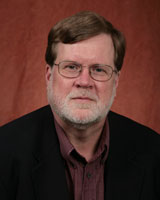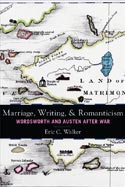 Eric Walker's new book, Marriage, Writing, and Romanticism: Wordsworth and Austen after War (Stanford University Press: 2009) is destined to change what we mean when we say, "Marriage is difficult."
Eric Walker's new book, Marriage, Writing, and Romanticism: Wordsworth and Austen after War (Stanford University Press: 2009) is destined to change what we mean when we say, "Marriage is difficult."
Instead of referring to the challenges, both quotidian and epic, that married couples face, the phrase for Walker encompasses the fundamental problem of Western Civilization. The difficulties of marriage extend to bureaucratic ontology (one literally doesn't count on the U.S. 2000 Census long form unless marriageable) and to the very possibility of human freedom. Marriage, as both a social practice and philosophical concept, rules from the center of our collective life. Walker claims that it has traditionally divided literary culture into two camps: the epithalamic (writing in praise of marriage) and the anticonjugal (writing to end marriage). However, from the Romantic period forward, this division has been more apparent than real. One is enthusiastically for or stridently against marriage, but such a choice amounts to no choice since, either way, one ends by acknowledging marriage's centrality.
Walker summarizes the paradox like this:
The chapters that follow shape an argument that, at greatest stretch, takes this abbreviated form: modern marriage... is the site of a representational crisis as wide as writing itself. Creating an impossible dilemma, the habit of modern marriage is to lodge this doubly outrageous bid: marriage is the only tale to tell—and if that insult couldn't be topped, it is a tale that is untellable.
Hegel's comment that marriage is "life in its totality" entwined with Kierkegaard's notion that "conjugal love does not come with any outward sign" ties a structural knot in the weft of language itself, a knot that binds everyone to inexpressiveness. For all its centrality, Marriage has no idiom of its own. To explain the problem, Walker turns to two sets of literary works of the Regency period: the novels of Jane Austen and an obscure work by William Wordsworth. The wedding of these texts turns out to be revelatory, adding to the epithalamic and anticonjugal a third discursive mode, a seditious form beyond the jurisdiction of marriage culture. Walker names this recalcitrant mode, "indifference." In his PMLA article, "The Muse of Indifference," Walker writes:
I adopt indifference to signify forms of writing that work in fugitive ways outside the forensic boundaries of marriage culture, which constrain marriage writing whether it is epithalamic or anticonjugal. These texts do not write narrowly for or against marriage as, outrageously, freedom's necessary form but, more widely, write against the foundational grain of a pervasive marriage culture that would preempt the subjects and forms of writing, as well as the question of freedom.
 William Galperin of Rutgers University calls Walker's book, "erudite, beautifully written, and the result of a career-long investment in a variety of issues whose uncanny connectedness is perhaps paramount among the study's many virtues. It is as close to the paradigm of the scholarly book as a study is likely to get." Celeste Langan praises Marriage, Writing, and Romanticism as "provocative and intelligent—and stylish. It makes a substantial contribution to Austen and Wordsworth criticism and (with Cavell's help) turns 'marriage' into an unexpectedly fascinating philosophical problem." Marriage, Writing, and Romanticism reveals the anxiety of coupledom as our lingering discontent with our modern secular state.
William Galperin of Rutgers University calls Walker's book, "erudite, beautifully written, and the result of a career-long investment in a variety of issues whose uncanny connectedness is perhaps paramount among the study's many virtues. It is as close to the paradigm of the scholarly book as a study is likely to get." Celeste Langan praises Marriage, Writing, and Romanticism as "provocative and intelligent—and stylish. It makes a substantial contribution to Austen and Wordsworth criticism and (with Cavell's help) turns 'marriage' into an unexpectedly fascinating philosophical problem." Marriage, Writing, and Romanticism reveals the anxiety of coupledom as our lingering discontent with our modern secular state.
Eric Walker is President of the Faculty Senate at FSU, specializing in Romanticism and 18th century studies. His current book project is on Romanticism and adoption.
